By Shkëlqim ABAZI
Part twelve
SPAC
The Grave of the Living
Tirana, 2018
(My memories and those of others)
Memorie.al / Now in my old age, I feel it is my duty to tell my truth, just as I lived it. To speak of the modest men who never boasted of their deeds and of others whose mouths the regime sealed and buried them in nameless pits. In no case do I take it upon myself to usurp the monopoly of truth or to claim laurels for an event where I was a random witness, even though I tried with all my heart to help my friends, who politely and kindly avoided me: “Brother, open your eyes… don’t get involved… you only have two months and a little left!” A worry that clung to me like an amulet, from the morning of May 21, 22, and 23, 1974, and even followed me in the following months until I was released. Nevertheless, everything I saw and heard those three days, I would not want to take to the grave.
Continued from the previous issue
– “I will keep what you did to me today as an eternal lesson, oh Comrade Xhelol!” – Xhafa’s vein popped, addressing his friend with a communist’s vocabulary. Xhelali froze, shook his head as if to convince him that those words had been said for real, took a breath, took a few bewildered steps, and turned back to Xhafa:
– “I didn’t quite catch that with my ear?” – He cupped his hand to his ear. – “I said what I said, oh comrade Xhelol…” – but he didn’t finish the previous phrase. Xhelali’s mustache roots even turned red: – “You are Xhelali of your mother and your father, you rude rascal, you’re worse than the communists! You were a covered ember, man; you sold me out for a bottle of raki!” – he burst out and scowled: – “I am your friend, but not your kind!” – He was shaking and foaming as if he had an epileptic fit.
The situation was about to spiral out of control, so I jumped over the embankment and found myself near the bush, retrieved the bottle, and shook it in front of Xhafa’s eyes. He sprang up and lunged toward me, making me think he was attacking, but he snatched the bottle and kissed it crazily. Never had I seen a person caress and kiss something with such passion as that “blessed” bottle.
– “Oh, my God bless you for saving me!” – he caressed it like a child. – “You gave me wings, boy, as if I were twenty years old! Xhelal Beu, come on, you’re crazy!” – he addressed him as if they hadn’t argued moments before. – “Come here, professor-o, take a little sniff, man! By the Almighty, you have honored me, boy! Oh God!” – he sighed, kissed the bottle, and chugged it down. He took one, two, three gulps, removed it, wiped his lips with the back of his hand, sniffed it like designer perfume, and rejoiced over it like a child with Santa’s sack.
I was stunned; I had never encountered such a scene, nor had I imagined a melancholic Xhafa rejoicing and jumping up and down, caressing the bottle, sniffing it, leaning on one side, then jumping to the other, as if he had received the news of his release from prison; he hugged Xhelali, embraced Agimi, even thanked me, the cause of the commotion, and sniffed himself, putting the neck of the bottle to our noses, so we could sniff too.
– “Drink, Xhelolo, drink, professor-o, drink, boy, but just a little, because we need the insides!” – And he would take it back as soon as it left our lips. – “It’s blessed, boy, even though its plum raki, the rascal distilled it with passion! He’s an expert master!” – He praised the unknown distiller. The boom of the gong cut short his torrent of praise. We handed over the tools and gathered at “Golgotha.”
There, Xhafa slipped away with the bottle under his sheepskin coat, heading toward the laboratory, “he must be securing it, I thought,” but I was mistaken, because he waited until the police officers took their places and slipped in next to Captain Jaku. This maneuver surprised me; using the excuse of lightening a friend’s load of wood, I did a U-turn and lined up behind him. Just as Xhafa pretended to open his arms and the police officer pretended to check him, I grasped the silent agreement.
When my turn came, Jaku bellowed:
– “What do you have there, you?”
– “Firewood!” – I replied.
– “It’s material, convict!”
– “Leftovers, though!” – I insisted.
– “Do you want to spend the night in the hotel, huh?” – he threatened me.
– “No!”
– “Throw it here!” – he pointed to a pile of strawberry tree stumps and wood shavings.
– “Throw it away; they are in a bad way!” – My friend who gave them to me whispered.
– “Shut up, you, if you want to sleep on the bed!” – he snapped at the brave one.
I dumped them on the pile, because they turned into beasts when they ran out of firewood; they confiscated every scrap to supply their kitchen. With the bowl in hand, I got the swill from the cauldron and was returning to sip it somewhere.
– “Çimo, come on, we are waiting for you!” – Met Kazazi, everyone’s friend, invited me.
I returned to the Culture Hall where Xhafer Dema, Xhelal Canko (Beu), Agim Musta (the professor), and Met Kazazi were “waiting.” So, except for Meti, the “waiters” knew about the flask.
– “You are burning it up, oh Xhaf Dema!” – I addressed him, leaving my bowl on the edge of the pile.
– “We have a big reason, boy-o, I have forgiven Xheloli the wealth of Greater Dibra, with all its surroundings! To your health, then!” – And he pulled out a flask from under his sheepskin coat.
– “Cheers!” – Xhelali also wished. – “As for that wealth you speak of, may you and Agimi enjoy it; it’s not enough for you Dibran-Gjirokastrians, let alone for others! Besides, aren’t we done with ours?” – he stroked his mustache and strutted like a tomcat in the rye.
I remembered the bread and spoon and made a move to get up, but Meti cut short my momentum:
– “Where is your flask, boy?”
– “I didn’t think of it….”
– “Come on, we’ll give you a bite each, but where will you put this liquid?” – And he pulled out the bottle from under the table; not more than a finger’s worth remained at the bottom.
– “No problem, I don’t drink it!” – I gathered the bites they gave me and gulped them down.
– “Boy, without you, the trick would have remained for us!”
Xhafa forgot the troubles I caused him and congratulated me as if I had performed a miracle; he snatched the bottle from Meti and shook it, rejoicing at the chain of beads.
– “By God, the rascal distilled it with passion!”
– “To the one who will tell me how the bottle got here, I have forgiven my share!” – Without specifying to whom.
– “Agreed! – Xhelali jumped up. – But to whom, man?”
– “My mother’s! – Xhafa jumped up and poured a draft. – Now I’ll tell you at the evening roll call!” – he added after sipping a gulp. They finished it and we parted.
I was with the elders in the “square” when the snakes hissed (whistle for roll call). Xhafa signaled me from the far end of the square to approach him. I split away with a silly excuse, and we ended up in the private kitchen after the count, where he brewed coffee and got straight to the point:
– “You wanted to know how I got the raki in?”
– “Yes.”
– “It’s nothing, man; when I could, I traded, when I couldn’t, I drank alcohol, as you saw!”
– “Ultimately, Naim and Dilo have the alcohol in their hands, but how do you manage with the raki?” – I interrupted him.
– “It’s not easy to find alcohol, friend! That Dilua is a Gjirokastrian tightwad, but money pulls water uphill, let alone people! I give him tobacco and a paper notebook, and he gives me what I want. With Naim, there’s no bargaining, he’s a Krutan (from Kruja), man!”
– “But how do you manage with the raki?” – I hurried again.
– “Raki can also be made inside, but people have become cheats, and instead of pure grapes, or some sweet fruit, they make it with apple and fig jam and throw in alcohol. It’s more profitable to deal with Dilo and get pure stuff than to buy the mixed kind!”
– “Excuse me for interrupting, where did you find the raki?!”
– “Slow down, you’re completely dense, boy! What can’t money do, man? If you want soap, it brings it, if you want honey, it brings it, if you want poison, it brings it, and you just have to find the way!”
– “How did you find the way, man, there’s no goods or money here?” – I interrupted, surprised by what I was hearing at the table.
– “Don’t grieve, boy-o! The police officers are human, and the engineers are God’s creatures! There’s no need for money, there are other things! There are apples too, but if there are none inside, there are outside; give them this, and they bring you that, you just have to strike a deal!”
– “Who did you make the deal with, Xhaf?”
– “With Jaku, man!”
I knew him as a trader by spirit, but I couldn’t imagine how he tempted free people or police officers to bring in forbidden items when they would face the consequences.
– “He’s a savage, hard to find his strings!”
– “He’s savage with you! He wanted a ring to get his brother engaged, I found it for him! Me the gold, him the raki!” – and he gestured toward himself and toward me, to imply a reciprocal exchange.
– “A gold ring for a bottle of raki?!” – I acted surprised.
– “Who told you it was just one flask, man? There were other things in between!”
– “Were you upset when you didn’t find the bottle? I did it for fun, I apologize,” – I changed the topic.
– “No, man! Thank goodness you did it, because you’re a good boy! But, if Xheloli had gotten his hands on it, the dregs would have been left for the others!”
– “Were you scared when you didn’t find it where you had hidden it?” – I asked to bring it to an end.
– “I was scared, truly! If I had known it was you who did it, I would have felt like the one who hides money in a Swiss bank” – he added, and the conversation ended.
All night, passages from this conversation flashed before me in sound and image. The forbidden objects and actions, which belonged to the world outside the fence, seemed abstract to me.
But the unusual incident and others later on, would convince me that the more you tighten the rope, the faster it will break. Based on that example, I explained the espionage and counter-espionage that, since that day, no longer seemed like writers’ fantasies, but a tangible reality.
Referring to the fact, I understood how characters available for bargaining were sold and bought, I understood why battles that were thought to be won were lost, why Kingdoms and Empires were overthrown without firing a shot and without shedding a drop of blood, why governments were changed with coups led by the trusted people of the one who was being overthrown.
I managed to explain Caesar’s surprise and Brutus’ knife. I understood Judas who sold Christ for five pieces of silver, but also the functionaries of the Fourth Directorate with their deliberate misinformation or “Radio-Prison,” which gathered and disseminated false news with “infra-short waves.”
Under the vision of the unparalleled example, I answered dozens of questions. In the course of the years, it would turn out that Jakus existed in every environment, Xhaferrs were present in every cell, but for them to come to the surface, the conditions had to match the real possibilities.
I myself did not get involved in this dance, for lack of desire, but above all, I was not inclined to bargain. If the opportunity presents itself, I will also talk about Met Karakashi’s “Distillery,” which turned into a Winery during the grape season, but also about the “cauldron” of Milto Feshti and Fiqiri Muho in the Spaç workshop.
The Nightmare of Release and the “Decent” Clothes
26.07.1973, the imprisoned card-keeper called me and informed me that I would not go to work the next day: “Get ready, they might release you!” I was anxiously awaiting my release.
After May 21, 1973, my family visited me twice; the last one must have been in the first ten days of July. They asked me for the approximate date of my release; I told them around the end of July, so I was expecting one of my brothers to bring me clothes and accompany me to the “free world.”
After the Revolt, no one was sure of their release. In the hellish camp, they made our lives so miserable that lead seemed like honey over the barbed wires.
I lacked information even about the day-reductions, because by my calculations and those of my friends, it came out to be around July 29 or 30, if I was lucky enough not to be re-arrested.
So, it meant I had earned eleven to twelve days of reduction over five years. Very little for the toil in the mines, but escaping hell an hour earlier was a satisfaction. Thus, the notification caught us by surprise.
I say “caught us,” because my friends got caught in this trap; they were preoccupied with getting me a full set of clothing, as they did not want to give the police officers or others I would encounter on the road the satisfaction of seeing me like a “skinned onion,” so as “not to leave the impression of an abandoned person who did not know where to put his head outside the iron gate!”
In the middle of summer, a pair of pants, a shirt, and a pair of shoes were enough, but I did not even have that much.
I had kept a prison uniform and a rough poplin shirt in a sack as relics, but my friends did not have the heart to see me in those miserable clothes. Tomor Balliu, Zef Ashta, Astrit Delvina, Qani Çollaku, Myslim Fuatllari, Pavllo Lako, Esat Kala, and other friends were troubled and asked for “decent” clothes, in their words.
After efforts, the first “volunteers” appeared: Kujtim Murati from Kanina donated the pants, Shuaip Seiti from Shkodra the shirt, Tomor Balliu from Çekini i Gramshit the suitcase, Fiqret Islami from Shkodra the handbag, Dhimitër Bifsha from Dhërmiu the underpants, and Fiqiri Ballolli from Devolli the undershirt. The shoes did not fit me; they were either too big or too small, and even those that fit were dried and shriveled from being kept in sacks.
This turned into a nightmare for my friends, even though I joked: “I am willing to go out in rubber sandals or barefoot, just to make it on time,” because I did not believe I would be released. The echo of the Revolt had reached its peak, and re-arrests spared no one; they would even put handcuffs back on those we had just seen exit the crossed iron gate, as if they hadn’t been inside just two minutes before.
I repeat, I felt insecure. But the sad premonition did not deter my friends, and they began bargaining with the profiteers, who asked, some one thousand leks, others fifteen hundred, a third offered nine hundred, and so on.
The traders came, asked for my shoe size, and convinced they would win the secret tender, which turned into an open market, they left in search of the goods.
In the evening, hopes had almost faded, when Esat Kala appeared with a cardboard box, inside which lay a pair of brand-new shoes.
– “Try them on, if they don’t fit, give them back, and we’ll get others!”
They fit as if I had tried several pairs before they brought them to me.
– “Tomorrow, when you leave, you will give Mark ‘the mustachioed’ nine hundred leks. We understand each other, I hope?”
– “Agreed.”
– “Don’t leave without paying, or you’ll close the door for us next time!” – he warned me.
I thanked him, although I did not find out who the kind-hearted trader was. The next day, the camp’s financier withheld one lek from my account.
Let’s conclude this and return to the topic we interrupted for this unplanned intermezzo.
The “antidotes” took on special values for different individuals; for some, they were an added food source, for others, a source for missing items.
The treatment with a few extra clothes and a few more crumbs did not bring about a miracle; every day you encountered malnourished people, you would run into ragged, pitiful skeletons. The convicts lived the stagnation of hunger, the sadism, and the bestial violence, while the whole people vegetated in the Republic of Misery, Horror, and Terror.
The clothes were either unsuitable for outside the mines, or, if you managed to modify them, they remained equally unfavorable for daily use. When we saw each other dressed in sheepskin suits in the scorching heat, with a tarpaulin over them, rubber boots on our feet, which we did not take off in winter or summer, and pressed cardboard helmets on our heads, we felt like actors in science fiction movies, in the role of astronauts.
But while they were dressed in asbestos clothes to protect them from radiation, thus transforming them into extraterrestrial beings, we were turned into cave-dwelling reptiles. The actor-astronauts move in a vacuum space where they do not even feel their own burden, because the concept of weight, which earthly mortals give it, is lost in cosmic space; we scarecrows entered and exited the damp holes, dragging, like a turtle its shell, not only the two-ton wagons but also the doubled weight of our clothes. Memorie.al




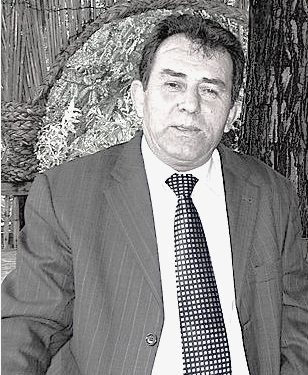
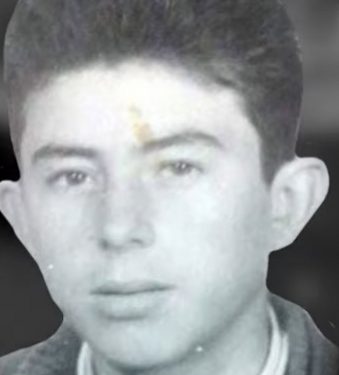
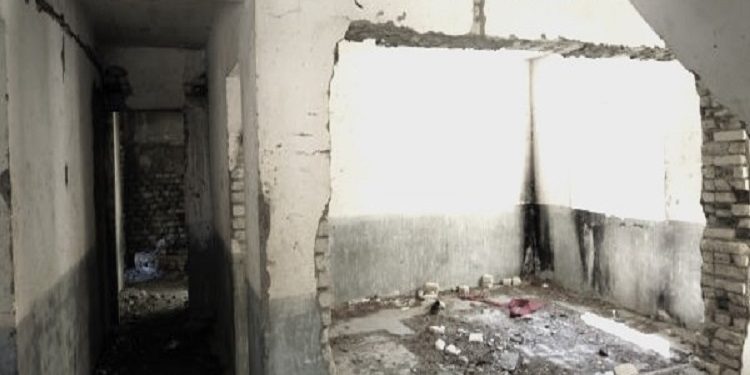
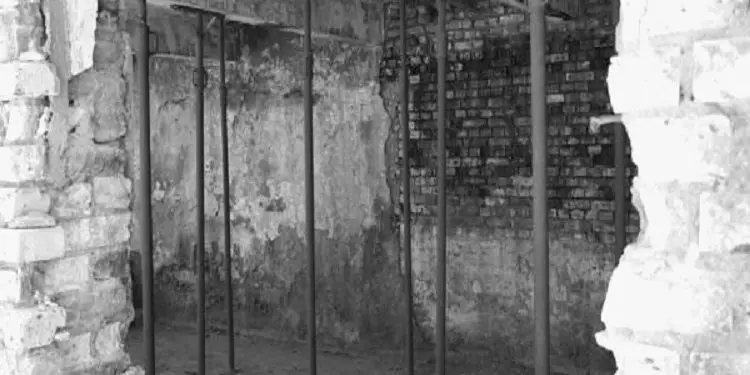
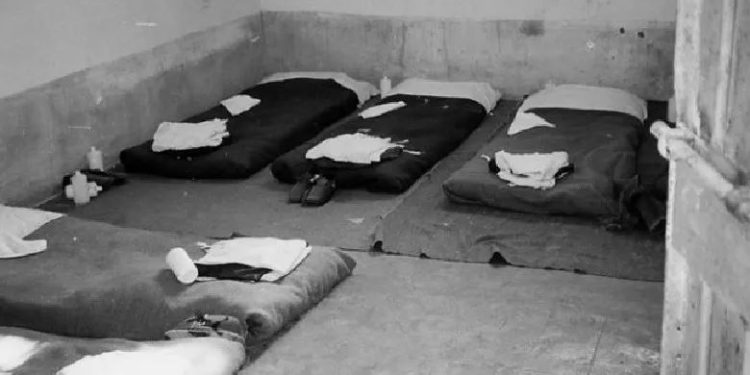
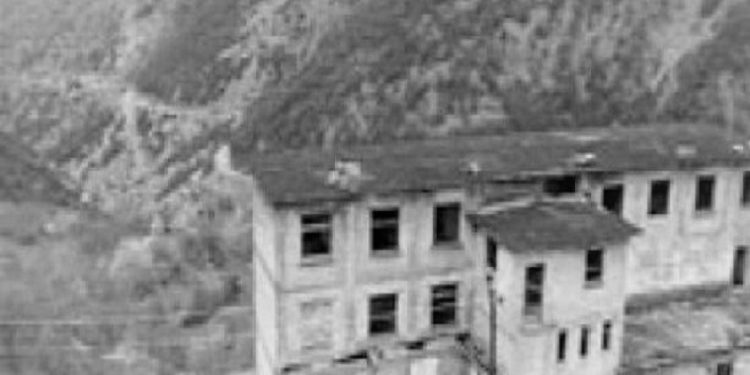
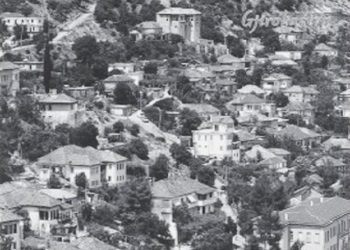
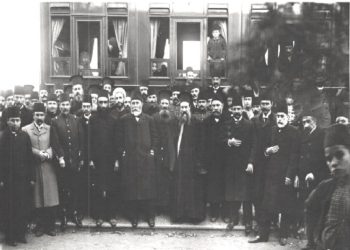
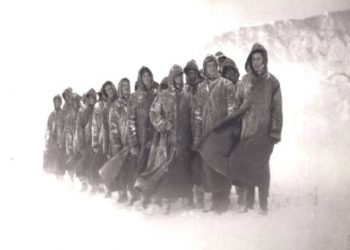

![“When the party secretary told me: ‘Why are you going to the city? Your comrades are harvesting wheat in the [voluntary] action, where the Party and Comrade Enver call them, while you wander about; they are fighting in Vietnam,’ I…”/ Reflections of the writer from Vlora.](https://memorie.al/wp-content/uploads/2025/06/admin-ajax-4-350x250.jpg)

